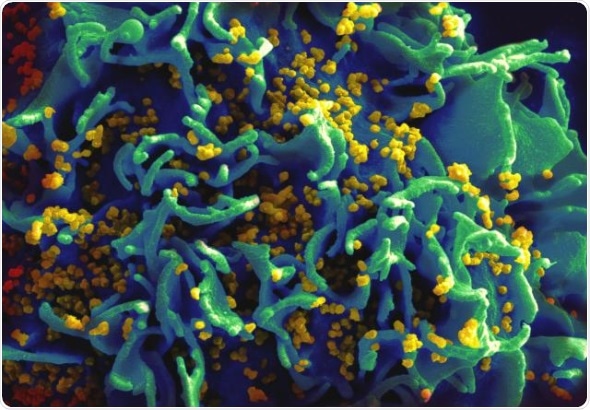Apr 8 2019
Gut microbes from high HIV-risk men who have sex with men drive immune activation in mice and HIV infection in cells, according to a study published April 4 in the open-access journal PLOS Pathogens by Brent Palmer and Catherine Lozupone of the University of Colorado Anschutz, and colleagues.

HIV-infected H9 T cell. Credit: NIAID, Flickr CCBY2.0
The communities of microbes that colonize the human gut play a significant role in shaping the immune system. Recent studies have reported a distinct gut microbiome composition in men who have sex with men exhibiting HIV-risk behaviors when compared with low-risk men who have sex with women, regardless of their HIV infection status. Whether these gut microbiome differences in high-risk men who have sex with men directly impact immune activation is important to understand because increased T-cell activation is associated with increased HIV transmission risk and more severe disease. To test the immunological effect of the gut microbiome in men who have sex with men, Palmer and Lozupone transplanted stool from HIV-negative men who have sex with women, HIV-negative high-risk men who have sex with men, and HIV-positive men who have sex with men to germ-free mice.
DNA sequencing showed that specific microbiome differences associated with men who have sex with men were successfully engrafted in mice. Moreover, these differences were associated with increased CD4+ and CD8+ T-cell activation in the mice. These results provide evidence for a direct link between microbiome composition and immune activation in HIV-negative and HIV-positive men who have sex with men. According to the authors, the findings suggest that the gut microbiome might be a risk factor for HIV transmission.
The authors conclude:
Gut microbiota from men who have sex with men (MSM) induce activation of HIV target cells when transplanted to mice and stimulate HIV infection of human gut cell cultures. These findings support a role for the gut microbiome in HIV transmission in MSM.”